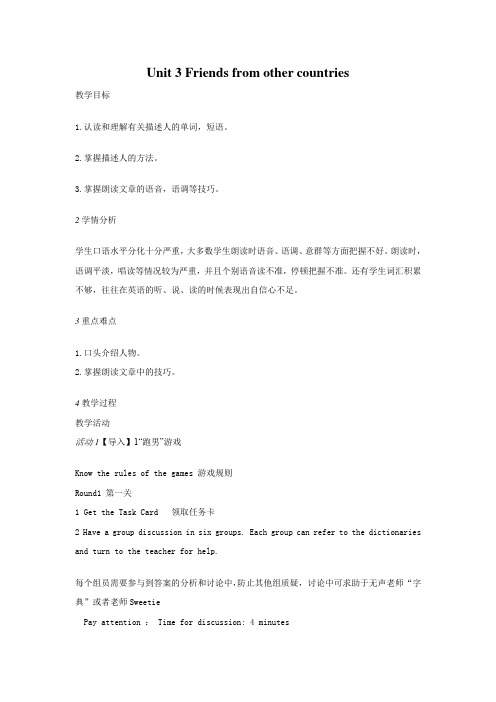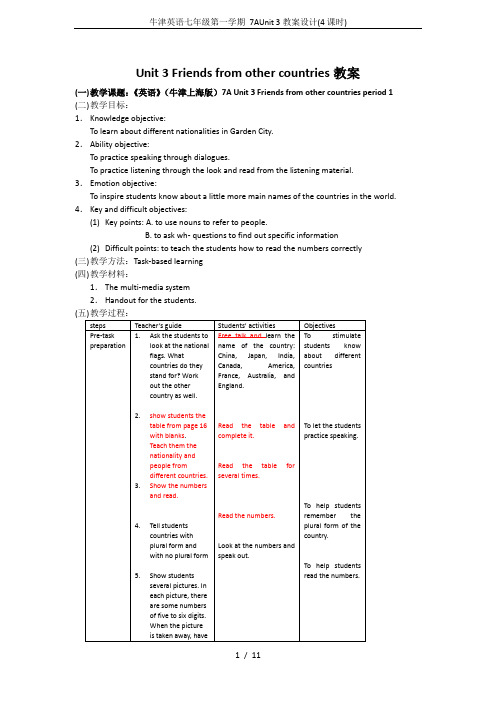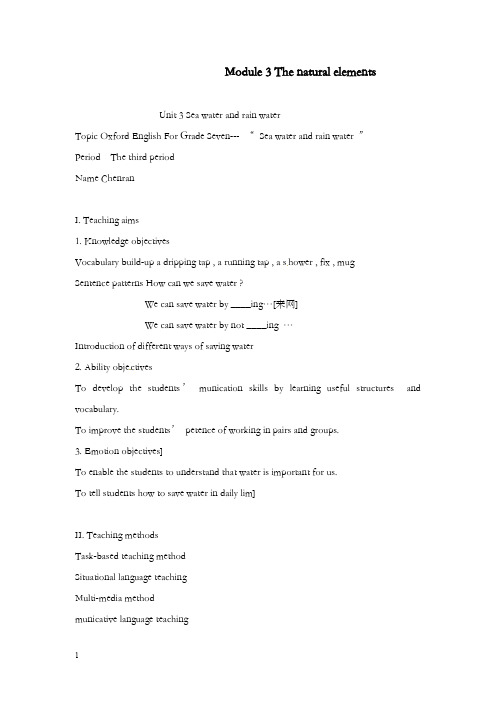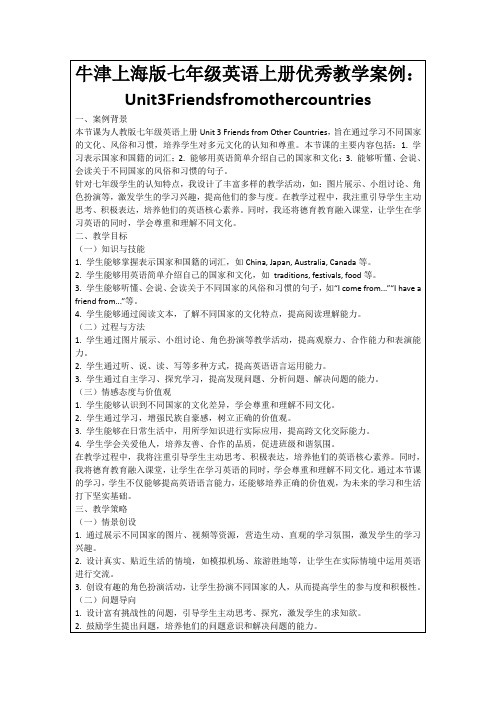7A unit3 最新广州、深圳沪教版牛津英语七年级上册教案
教师用 牛津英语7AUnit3复习教案

教师用牛津英语7A Unit Three(Let’s celebrate!)复习学案以学生为中心的活动导学,注重自主、合作、探究。
Teaching procedures.Activity 1: Check what has been learned in the preview sheet and talk about the questions in the preview sheet.(in groups)Activity 3:Fill in the blanks with proper prepositions of time(‘at’/ ‘on’/ ‘in’). According to the pictures.1At:In:On:Activity 4:check the words of the vocabulary.Activity 5: Fill the blanks according to the reading.The people in the USA do not c_______ Mid-Autumn Festival, but they celebrate Halloween. They have a s______ Halloween party on ____________.The children play a game called ____________.Usually, people give them c ______ as a treat. If they don‟t, the children can ___________ on them. The children always __________ at Halloween. They wear special costumes with m_____. They sometimes _____________and people do not know who they are. This year, Wendy will wear_______________. They make their o____ Pumpkin lanterns. They _______ the eyes, the nose and the sharp t______. The family always have a party _____________October 31st. It usually starts at 8 p.m. They eat lots of special Halloween c__________ and candies. They have _________and eat lots of nice, hot f______.Activity 6:Sandy also wants to know something about Halloween.But she forgot how to ask questions. Please help her complete h er questions using ‘Wh-’ words.•S: _____ festival does Wendy tell you about ?•M: She tells me about Halloween.•S: _____ do people in the USA celebrate it ?•M: They celebrate it on October 31st.•S: _____ likes Halloween best ?•M: Children usually like it best.•S: _____ do they do at Halloween ?•M: They play a game called …trick or treat‟.•S: _____ else do they do ?•M: They also wear special costumes and paint their faces.•S: _____ do they paint faces?•M: Because people don’t know who they are.•S: _____ do they make pumpkin lanterns?•M: They cut out the nose and the teeth with a sharp knife.•S: ______ do they have parties ?•M: They usually have parties at home.探究小结2:疑问词的用法1.I do some housework on Sundays.2.He will go to the school Christmas party on foot.3.The boy in red is my friend.4.He wants to go shopping for a costume.5.You can put the candles in the lantern.Activity 7: A guessing game. Sandy has bought a lot of things for you.If you want to get them, you should guess what’s in the box.“Are there any …in the box ?\Do you have any… in the box ?\Maybe there are some… in the box.?”There are some CDs / chocolates / comic books / mooncakes.What do you want ?Would you like some… ?探究小结3:More exercise about usage of “some” or “any”1.Would you like bananas?2.May I have milk? I’m very thirsty.3.Can I get youtea?4.Shall I bring food here tomorrow?5.Do you have cakes?\No, I don’t have .Activity8:Correct the article :Millie also writes an article about Chinese New Year. But she has made some mistakes. Please help her to correct them.Chinese New YearEvery year people are celebrate the Spring Festival in China. Usually it’s on January or February. Before it comes, everyone buy many things and they often make a special kind of food call dumplings. Parents always buy new clothes to children and give them any red packets.In Chinese New Year’s Eve, all the family member come back. They have dinner together. After they enjoy the meal, they often watches TV or play cards. They all have good time.即时训练请你模仿Millie的文章,写一篇介绍中国的中秋节的文章给你的外国网友Tom(字数:60).内容包括:1.中秋节在每年的八月或九月.2.这是个全家团圆的节日. 在那天晚上全家人在一起吃饭.3.在中秋节我们吃月饼并且可以在晚上赏月.4.我们在中秋节都过得很愉快.Activity9:A).根据句意和所给中文写出句中所缺的单元1.J________ is the first month of a year.2.The last month of a year is D__________3. A_______ comes between March and May.4.I was born in F_______ 1993.5.It is usually hot in June, J______ and August.6.A______ is the best season in Beijing.7.The last four months of a year are September, October, N________ and December.8.In s_________, the days start to get warmer and flowers come out.B).介词填空1. Millie gets up ___ six o’clock.2. Our party is ___ the morning.3. Simon was born ___ 1989.4. ___ Halloween, we wear different costumes.5. We will have a meeting ___ Friday.6. ___ September 10th, we celebrate Teachers’Day.7. ___ a cold morning, the poor man died.C).就划线部分提问1. Mr. Hu is my English teacher?2. I sometimes to go school by bus.3. Jim is singing an English song because he likes English very much.4. They are swimming.5. Mum is cooking a big fish.6. My books are in my desk.7. His name is on the blackboard.8. Children’s Day is on June 1st .9. I like the white flower.Activity10:课后提升:请先写出五个你所知道的节日,并选择一个你最喜欢的节日进行介绍,字数不少于60字。
牛津上海版 初一英语 七年级上 Unit3 教学设计

Unit 3 Friends from other countries教学目标1.认读和理解有关描述人的单词,短语。
2.掌握描述人的方法。
3.掌握朗读文章的语音,语调等技巧。
2学情分析学生口语水平分化十分严重,大多数学生朗读时语音、语调、意群等方面把握不好。
朗读时,语调平淡,唱读等情况较为严重,并且个别语音读不准,停顿把握不准。
还有学生词汇积累不够,往往在英语的听、说、读的时候表现出自信心不足。
3重点难点1.口头介绍人物。
2.掌握朗读文章中的技巧。
4教学过程教学活动活动1【导入】1“跑男”游戏Know the rules of the games 游戏规则Round1 第一关1 Get the Task Card 领取任务卡2 Have a group discussion in six groups. Each group can refer to the dictionaries and turn to the teacher for help.每个组员需要参与到答案的分析和讨论中,防止其他组质疑,讨论中可求助于无声老师“字典”或者老师SweetiePay attention : Time for discussion: 4 minutes讨论时间4分钟,注意把握时间Take notes when you are discussing.讨论过程中做好笔记活动2【活动】Round2Run and show the correct answers on the blaRound2Run and show the correct answers on the blackboard in 30 seconds.派代表跑步写答案 30秒Pay attention :1 展示在后面黑板上2 写清楚题号活动3【活动】Round3Attacking and DefendingRound 3 Attacking and Defending “攻擂与守擂”Defending team: Explain why you choose these answers“守擂“组:需要每个成员能对所选选项做出解释,防止被攻擂组轰炸. “守擂”组成员可以形成同盟,互助解答,答对加分 .若守擂组答错或不会解答,其他组来争当擂主,答对加分,答错不扣分Attacking team: Ask questions to anymember of the defending team“攻擂”组:向“守擂组”任何成员提问题,要求其回答(1不能重复点“守擂”组的某个成员。
最新广州、深圳沪教版牛津英语七年级上册教案一至三单元

7A UNIT 1 Making friendsⅠ重点单词:World n. 世界country n. 国家Japan n.日本Germany n. 德国German adj.德国的n.德国人Everyone n。
人人(谓语动词要用单数) Us pron。
我们yourself pron.你自己age n. 年龄elder adj. 年长的friendly adj。
友爱的Hobby n.爱好(复数hobbies) dream n。
梦想complete v. 完成grammar n.语法blog n。
博客sound n。
声音engineer n。
工程师flat n。
公寓mountain n. 山Ⅱ重点短语:1。
colse to 接近 = near 反义词:far (away)from 远离2.Go to school 去上学3。
Be good at 擅长 =do well in 反义词:be bad /poor at=do badly in不擅长4。
Make friends with 与……交朋友 make friends 交朋友5。
All over 遍及6。
I’d like to=would like to 愿意Ⅲ重点句型:1.what does···mean?2.welcome to3.I like···because···4.My dream is to be··?5.How old is/are ····?6.What does ····do?详细讲解:1.Read a German girl’s blog。
(Page1)(1)German :①adj。
德国的 (德国人的,德语的)This is a German car。
牛津英语七年级第一学期 7AUnit 3教案设计(4课时)

Unit 3 Friends from other countries教案(一)教学课题:《英语》(牛津上海版)7A Unit 3 Friends from other countries period 1(二)教学目标:1.Knowledge objective:To learn about different nationalities in Garden City.2.Ability objective:To practice speaking through dialogues.To practice listening through the look and read from the listening material. 3.Emotion objective:To inspire students know about a little more main names of the countries in the world. 4.Key and difficult objectives:(1)Key points: A. to use nouns to refer to people.B. to ask wh- questions to find out specific information(2)Difficult points: to teach the students how to read the numbers correctly(三)教学方法:Task-based learning(四)教学材料:1.The multi-media system2.Handout for the students.(Feedback 1I.Translation(写出下面词组)1.花园城市的外国人________________2.一个拥挤的城市__________________3.超过八百万人____________________4.举个例子________________________5.叫来自英语的人英国人____________II.Choose the best answer(选择正确的答案)1.---Have you bought any present for your friends from Japan?---Yes, I _______.A.doB. didC. haveD. had2.I’d like ______ some sweets.A.havingB. to haveC. haveD. had3.Let’s go for a trip _______ a sunny day.A.onB. inC. forD. at4.Where do Tim and Tom ______ from?esB. comeC. isD. are5.There is going to _______ a class meeting this afternoon.A.haveB. hasC. beD. isIII.Rewrite the sentences as required. (按要求改写句子)1.Mum has already bought much fruit. (改为否定句)Mum ________ _________ much fruit ________.2.He needs 100 yuan to buy the food. (改一般疑问句)_______ he ________ 100 yuan to buy the food?3.Tom’s new friend comes from the USA. (划线部分提问)_______ ________ Tom’s new friend come from?4.Sandy does exercise every morning. (划线部分提问)_______ _________ Sandy _______ every morning?5.There are five million people in Garden City. (划线部分提问)_______ ________ people are there in Garden City?后记:将表格放在前面教授,为文章做铺垫。
牛津上海版英语七年级上册《unit 3 sea water and rain water》优秀教案3篇(重点资料).doc

Module 3 The natural elementsUnit 3 Sea water and rain waterTopic Oxford English For Grade Seven--- “Sea water and rain water ”Period The third periodName ChenranI. Teaching aims1. Knowledge objectivesVocabulary build-up a dripping tap , a running tap , a s hower , fix , mugSentence patterns How can we save water ?We can save water by ____ing…[来网]We can save water by not ____ing …Introduction of different ways of saving water2. Ability objectivesTo develop the students’munication skills by learning useful structures and vocabulary.To improve the students’petence of working in pairs and groups.3. Emotion objectives]To enable the students to understand that water is important for us.To tell students how to save water in daily lim]II. Teaching methodsTask-based teaching methodSituational language teachingMulti-media methodmunicative language teachingIII. Studying methodEncou rage the students to study language through “observation----Imitation---Practice ”.IV. Teaching ProcedurePre-task preparation1. A petition to review the uses of waterDivide Ss into six groups . Ss take turns to say how to use water by using the sentence pattern We use water for ___ing. To see which group say the most.Ss think about the question Do you waste water when you use it?While-task procedure1. Introduce new words.Ss listen to three different sounds and guess where it is from.Then introduce new words by pictures a dripping tap , a running tap , a shower2. Show Ss some pictures of people wasting water.Picture One What is the boy doing ? ( He is brushing his teethHe is brushing his teeth under a running tap.What should we say to him? ( Don’t brush your teeth under a running tap.)Picture Two What is the woman doing ? ( She is washing dishes and vegetables under a running tap.)What should we say to her ? ( Don’t wash dishes or vegetables under a running tap. )Picture Three What is this ? ( a dripping tap )What should we do when we see a dripping tap ? ( We should fix it / We should turn the dripping tap off )Picture Four Taking a shower and having a bath , which is a waste of water ?( Having a bath )What should we do ? ( We should take a shower rather than have a bath) Picture Five What is the child doing ? ( He is playing with water )What should we say to him ? ( Don’t waste water for playing games )Ss think about How can we save water ?Introduce We can save water by ___ing…We can save water by not ___ing …Show Ss different pictures. In pairs , Ss talk about how to save water .eg. S1 How can we save water?S2 We can save water by fixing dripping taps.S1 How can we save water?S2 We can save water by not brushing our teeth under a running tap. Encourage Ss to think about more ways to save watereg. We can save water by not washing our face under a running tap.Post-task activity1. Ss make a conclusion Where do people usually waste water ?At home At school In the factory2. In groups , Ss choose a place and make a dialogue or a short play about saving water.3. In groups , Ss make a poster about saving water.Assignment Oral Read and recite the dialogue on P .44Written Write a report about different ways of saving water]教]resources on the internet2. To develop the students' abilities of listening ,readin g, writing and speaking3. To further understand the importance of saving water and arouse their awareness of savingwater and protecting environment4. To cultivate the students' abilities of cooperation and self-study课程标准的有关内容(英语国家课程标准)1.To stimulate and cultivate the students' interests of learning English through curriculumstudy and practice;2.To make the students' have confidence on how to learn English and cultivate ag ood habit tolearn English;3.To have a good mastery of four skills of listening, speaking, reading and writing;4.To cultivate the students' abilities of observation, memory, thinking, imagination andcreation ;5. To help the students to realize the world and tell the differences between the westernculture and the eastern culture and then cultivate the students' patriotism and dosomething for their future development;学习目标1.To hav e a good mastery of language focus1) Asking "How "questions to find out means2) Using connectives to express conditions3) Further understanding of the importance of saving water[2. To learn how to collect some information and resources of the themes of theforming process of sea water and rain water and arouse their awareness of saving water3. To learn how to discuss a certain topic in English and cultivate their abilities ofcooperation能力训练1. To train the students' abilities of how to collect the relevant information and resources o]the internet2. To train the students' four skills of listening, speaking, reading and writing3. To cultivate the students' abilities of cooperation教学策略Let the students find out their relevant resources on the internet by Google;read some reports onlack of water in some cities in China and saving water in some big cities in China and let thestudents further understand the importance of water and how to use water well and arouse theirawareness of protecting environment. Meanwhile ,let them have a good mastery of language focus.网]课程设计1.First,read index of contents about sea water and rain water2.Secondly, let students read some reports on lack of the resources of water in some cities inChina by Google and have a short discussion in groups of three or four and make some conclusion.3.Thirdly,read some reports on saving water in some cities in China by Google nd have a shortdiscussion in groups of three or four and make some conclusion.4.Then , watch some pictures of sea water without any pollut ion by Google5.Finaly, let the students have a warm discussion about the topic of sea water and rain water.Module 3 The natural elementsUnit 3 Sea water and rain waterTeaching PlanTopic牛津7A Module3 Unit 3 Sea water and rain waterPeriod The first period.School Ye Xie Middle School.Name Zhang Xiaoxia(张晓霞)Teaching aims [1. Knowledgable objectives(1) To learn and use some new words about oceans.(2) To learn how to ask ‘How’and ‘Wh-’questions to find out various kinds of specific information.(3) To have a general idea of the text.2. Ability objectives(1) To improve students’listening and speaking ability.(2) To have the awareness of petition.3. Emotional objectives(1) To know about the wonderful world under the water.(2) To educate students that people should protect oceans and the lives in water. Teaching difficulties one of …, by doing sth1) How many kindsArouse studentsshow t.(Not yet.)animals whales,1. Give some 1. Firsts questionsandpetition. 2. ToRecite the new words of this text.Read the text at least three time s.Students’activitypetition about oceansI. Ask students to get more information from puter before class.II. Divide the whole class into five groups.III.Give them ten questions.QuestionsHow much of the Earth is water?How many oceans are there in the world?What are they?Which is the largest ocean of the four ?Which is the smallest ?What is the largest animal, both on land and in the oceans?Name two intelligent animals on the earth.Name three beautiful things in the oceans.What can we get from the oceans?How can people get drinking water from the oceans?TopicsHow can we protect the earth?How can we protect the oceans?How can we save water?The importance of the oceans.The importance of sea animals and plants.Sea water and rain water 教学设计说明本教案是7A M3The natural elementsU3Sea water and rain water 的第一课时. 在学习本课之前我们已经学习了其他两种自然元素火和风,所以在对两者稍加复习的基础上很自然地引出我们今天要学习的第三种自然元素——水。
牛津上海版七年级英语上册优秀教学案例:Unit3Friendsfromothercountries

2.学生能够用英语简单介绍自己的国家和文化,如traditions, festivals, food等。
3.学生能够听懂、会说、会读关于不同国家的风俗和习惯的句子,如“I come from...”“I have a friend from...”等。
2.鼓励学生提出问题,培养他们的问题意识和解决问题的能力。
3.教师引导学生通过讨论、分析等方式,找到问题的答案,提高学生的思维能力。
(三)小组合作
1.引导学生分组进行合作学习,培养学生的团队协作能力和沟通能力。
2.设计小组讨论、小组竞赛等活动,激发学生的学习兴趣,提高学习效果。
3.教师关注各小组的学习情况,给予及时的指导和鼓励,确保每个学生都能在合作中得到提高。
2.问题导向:教师设计了一系列富有挑战性的问题,引导学生主动思考、探究,激发他们的求知欲。在解决问题的过程中,学生不仅提高了自己的思维能力,还学会了如何与他人合作、交流,培养了团队协作精神和沟通能力。
3.小组合作:教师引导学生分组进行合作学习,让每个学生都能在小组讨论、小组竞赛等活动中发挥自己的优势,提高自己的学习能力。同时,小组合作的学习方式也让学生学会了倾听、理解他人,培养了他们的团队精神和合作能力。
4.学生能够通过阅读文本,了解不同国家的文化特点,提高阅读理解能力。
(二)过程与方法
1.学生通过图片展示、小组讨论、角色扮演等教学活动,提高观察力、合作能力和表演能力。
2.学生通过听、说、读、写等多种方式,提高英语语言运用能力。
3.学生通过自主学习、探究学习,提高发现问题、分析问题、解决问题的能力。
2.提问:“你们知道这些国家的哪些信息?”让学生发表自己的想法。
Aunit广州深圳沪教版牛津英语七年级上册教案
7A U N I T5V i s i t i n g t h e M o o n 重点单词Diary日记??复数:diariesleave离开,剩下,留下ableadj.?能;能够space太空,不可数spaceship宇宙飞船spacesuit宇航员Nervousadj.?紧张的gravity重力floatv.漂浮ourselves我们自己的Without缺乏,没有tiev.捆;系;绑?tied,?tied,?tyingbreathe呼吸if如果camera相机workv.运转;运行garden花园rock岩石postcardn.明信片machine机器Return不及物动词,回来,返回=comeback及物动词,归还=givebackweak虚弱的,无力的heweakinheisweakinEnglish.重点短语:leavefor动身去某地Morethan超过,多余more···than比···更beableto会,能haveto不得不sothat以便takephotos拍照as···asonecan尽某人所能Assoonaspossible 尽可能快地thatis也就是说Suchas例如Atthemoment现在,此刻(可用于现在时和过去时)重点句型:1.Howfar···?2.···sothat··3.I’mgoingto···4.That’sagoodidea.详细讲解:1.It’lltakeustotheMoon.它将把我们带到月球。
(page59)Take···to··把··带到··2.It’lltakeusaboutfourdaystogetthere.将花费我们大约四天时间到达那里。
Unit3教案及练习牛津深圳版英语七年级上册
广州牛津英语七年级上Unit 3 The Earth 一、词形转换二、重点短语(单词与短语过关P106)三、重点句型(读背记)一、根据要求写出相应的单词。
1. protect (名词)2. energy (形容词)3. pollution (动词)4. burn (过去分词)5. important (名词)6. catch (过去式)7. report(名数) 8. nine (序数词)9. throw(过去式) 10. large(反义词)二、根据句意及首字母提示写单词,完成句子。
11. Pollution will k animals and plants.12. The pany always p a lot of money for the poor children.13. I have a small house in Shenzhen, but he has a l one.14. This unit is one of the nicest p in this book.15. It is i for you to understand the rules before you take part in the game.三、用括号内所给的提示词,完成句子。
16. Farmers grow many kinds of vegetables in the (田野).17. The bag is too much (大的) and heavy for the girl to carry.18. The pany (提供) the whole country with airconditioners these years.19. There is a lot of (污染) in this river.20. He has no (能量) to go on running! He has tried his best.21. Now more (land) are used to build houses.22. The picture is as (1arge) as that one.23. In the forest, people (burn) wood to grow crops in the old days.24. Miss Li, can you help me? I can't solve these difficult (problem).25. The white cat (catch) a mouse in the rubbish bin last night.四、根据句意,选出符合句子的最佳答案。
Unit3教案牛津深圳版(广州沈阳通用)七年级英语上册
通常作表语或后置定语
Is the fish still alive?
living
修饰人或物时须前置
All living things need air.
【短语·要点】
1.protectsb./sth.from…..保护某人/某物免受…..伤害
E.g. We must protect the forest from fire.我们必须保护那片森林免受水灾。
【句子·要点】
1.It is important for us to protect the Earth for our future.对我们来说,为了未来保护地球是重要的。
本句为“It + be +形容词+for sb.+动词不定时短语”句型,意为“对某人来说做某事是......”。其中it在句首作形式主语,后面的动词不定时短语才是句子的真正主语。
5.anyadj.一些。修饰不可数名词或可数名词复数均可。
any还可以作为代词,表示“任何”。e.g.I don’t like any of them.
any作形容词也有“任何的”之意,但只用于肯定句中。e.g.Any colour is OK.
辨析any与some
any
常用于否定句和疑问句中
Do you have any English book?
语法
1.能分辨常用的可数名词和不可数名词,并掌握其使用规律;
2.掌握存在句there is/are ....的用法。
【单词·要点】
1.Earth地球,其前需加定冠词the。
e.g.The Moon goes round the Earth.
on Earth = on (the) earth
最新精编 牛津上海版英语七年级上Unit3教案
一、单元分析(Unit Analysis)(一)单元地位(Unit Position)1. 本单元中出现了较多的国家名称和国籍名称。
大多数的单词已经在小学和以前的学习中出现过。
新出现的是the Philippines –Filipino(s), Thailand - Thai 。
容易遗忘的是Canada –Canadian, Britain – British, India – Indian.2.如何用英语来读出较大的数字,以及理解其中逗号的作用。
比如121,000 可以被读成one hundred and twenty-one thousand 英语数字的读法在听力测试和日常的英语场景交流中都起到了非常重要的作用,所以在这里可以进一步拓展,举例说明在较大的数字中逗号的不同读法和作用。
3.阅读英文的个人信息表,并准确填写。
学习其中的一些关键词:sex 要求填写性别nationality 要求填写国际address 要求填写地址age 要求填写年龄height 要求填写身高interests 要求填写兴趣爱好favorite subject 要求填写最喜欢的科目4. 重点学习和操练的是以下两个句型a) What do we call people from America?We call them Americans.通过对此句型的操练可以达到两个目的。
一、操练不同国家的名词和形容词表达法。
二、操练介词短语作后置定语的用法。
b) -- What have you visited? / Which country have you visited?-- I’ve visited…动词一般现在完成时的用法在7A Module 1 Unit 2中已频繁出现过。
本单元出现的visit的用法又是一个拓展。
(二)单元目标(Unit Target)1 巩固和掌握更多国家和国籍表达法。
2 能够正确地用英文读出千,万,百万等较大的数字。
- 1、下载文档前请自行甄别文档内容的完整性,平台不提供额外的编辑、内容补充、找答案等附加服务。
- 2、"仅部分预览"的文档,不可在线预览部分如存在完整性等问题,可反馈申请退款(可完整预览的文档不适用该条件!)。
- 3、如文档侵犯您的权益,请联系客服反馈,我们会尽快为您处理(人工客服工作时间:9:00-18:30)。
7A Unit3 The Earth
Ⅰ核心词汇:
Earth 地球quiz 小测试pattern 模式protect 保护
report 报告part 部分land 陆地v.登陆field 田地
large 大的provide 提供pollution 污染burn 燃烧
energy 能源ground 地面kill 杀死important 重要的
fact 事实kilometer 公里own 拥有catch 捕捉
problem问题pollute(动词) 污染call v.呼叫,称呼,打电话给···
Ⅱ重要短语:
protect tne Earth 保护地球protect sb./sth.from 保护某人/物,使不受伤害provide…..with为…..提供be covered by 被····覆盖
make energy 制造能源put….into把…..倒入、放入)……
stop doing sth 停止做某事(不做这件事了)只指一件事
stop to do sth停下来做某事(停止做这件事,去做另外一件事)
throw away扔掉throw about 乱扔如:Don’t throw about the waste paper.
have a good time 玩得高兴=enjoy oneself
get up 起床
Ⅲ重点句型:
1.The Earth provides us with air,Water and food.
2.It's +形容词+for sb.+to do sth.
3.There be +主语+介词短语
4.We can ask people not to do sth.
Ⅳ详细讲解:
1.some are large.(page31)
2.The Earth provides us with air,Water and food.(page31)
3.It's important for us to protect the Earth for our future.(page31)
为了我们的未来,保护地球很重要。
注意:It's +形容词+for sb.+to do sth.
It在句中作形式主语,整整的主语为不定式to protect the Earth.动词不定式作主语,可以放在句前也可以放在句后。
句中的谓语动词用单数。
4.Air has no smell.空气无味。
(page35)
no:①修饰可数名词时,相当于not a/an
如:she has no brother=she doesn’t have a brother
②修饰不可数名词时或者可数名词复数时,相当于not any.
There are no desk in the classroom.=There aren’t any desks in the classroom.
5.We can ask people not to eat shark fin soup.我们可以让人们不喝鱼翅汤。
(page37) Ask sb. to do sth. 要求/请求某人做某事(固定搭配)
Ask sb. not to do sth.要求/ 请求某人不要做某事
如:Our teachers always ask us to do homework after class.
7.We can take our own shopping bags to the supermarket.(page38)
①Fewer and fewer 越来越少
比较级+and+比较级表示“越来越···” more and more beautiful.
② fish 在这里表示可数名词“鱼”。
表示鱼的数量,单复数是一样的。
也可以表示不可数名词“鱼肉”。
We have fish for dinner.
10.We need air to breath.我们需要空气来呼吸。
①Need sb./sth. to do sth.需要某人/某物做某事
Need to do sth. 需要做某事 (You need to go there at once)
Need doing sth. 需要做某事(主语是物,主动形式表被动:the flowers need watering.)
②Need也可作情态动词,但仅用于否定句或疑问句中,后接动词原形。
例:Does he need to hand in his examination paper now? 他需要现在交卷吗?
- Must I finish my homework now?我必须先在完成我的作业吗?
- No,you needn’t.不,不需要。
12.In the end,only one sun remained.
In the end “最后,最终”常常是单独使用的。
At the end of “在···末尾”
Ⅴ语法专讲:Grammar
一、名词的数:
名词按其所表示的事物的性质可分为可数名词和不可数名词两类。
可数名词有复数形式。
不可数名词一般没有复数形式。
可数名词的单数往往要与补丁冠词a或an连用,复数则使用其复数形式。
(一)可数名词的单复数
1. 单数可数名词:表示名词的单数,要在名词前加不定冠词a或an. a加在以辅音开头的名词前,an加在以元音开头的名词前。
如: a book an apple
(1)少数以辅音字母加o结尾的名词变为复数时只加-s。
如:photo-photos相片 piano-pianos钢琴 zoo-zoos radio-radios
(2)一些名词的不规则变化
①元音发生变化
man-men男人 woman-women女人 foot-feet脚 tooth-teeth牙
②单复数形式相同
Deer-deer鹿 fish-fish鱼 sheep-sheep绵羊 Chinese-Chinese中国人
③词尾发生变化
Child-children孩子 ox-oxen公牛
④有些名词只有复数形式
Clothes衣服 trousers裤子 glasses眼镜 scissors剪子
(二)不可数名词
1.不可数名词的确切数量的表达方式
当表示不可数名词的确切数量时,通常可在不可数名词前面加上表示数量的单位词。
a glass of water一杯水 two glasses of water两杯水
A kilo of meat一公斤肉 two kilos of meat两公斤肉
2.不可数名词的不确切数量的表达方式
当表示不可数名词的各种大概、不确切的数量时,课运用下列单词和短语:
单词:not (any) / no没有; little几乎没有;a little / some一些;
most大部分; all全部
短语:a lot of / lots of /plenty of / much / a great deal of/.... 许多
二、There be句型
注意事项:
1.There be句型中be动词的形式要和其后的主语在人称和数上保持一致。
(主谓一致)
①如果句子的主语是单数的可数名词,或是不可数名词,be动词用“is”“was”。
例如:There is a basketball in the box. There is a little milk in the glass.
②如果句子的主语是复数名词,be动词就用“are”“were”。
例如:There are many birds in the tree.
There were many people in the street yesterday.
2.如果there be 句型后的主语是几个并列名词时,要根据第一个名词的数确定be的形式,
如果该名词是单数或不可数名词,be要用单数;若该名词是复数,be用复数。
(就近原则)如:There is an orange and some bananas in the basket.
There are some bananas and an orange in the basket.
3.There be句型表示“存在有”, have\has表示“拥有”“所有”,两者不能同时使用. There is going to have a class meeting next Wednesday. (错)
There is going to be a class meeting next Wednesday. (对)下周三有个班会。
